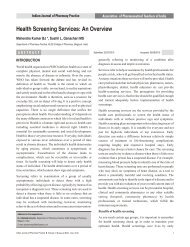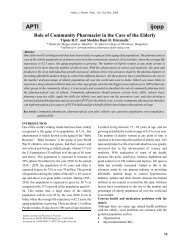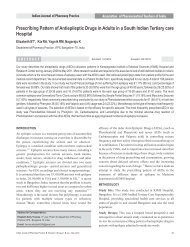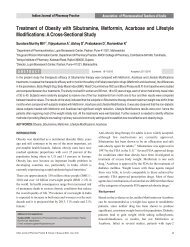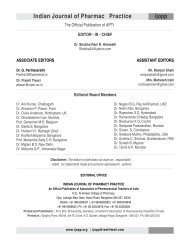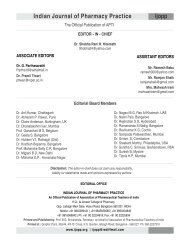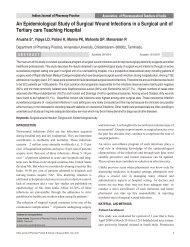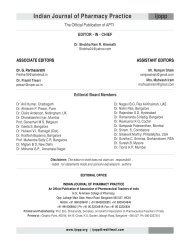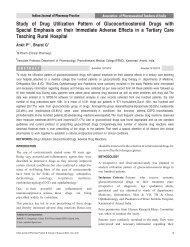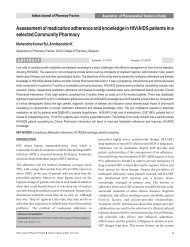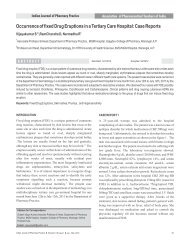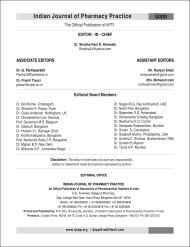APTI ijopp - Indian Journal of Pharmacy Practice
APTI ijopp - Indian Journal of Pharmacy Practice
APTI ijopp - Indian Journal of Pharmacy Practice
- No tags were found...
Create successful ePaper yourself
Turn your PDF publications into a flip-book with our unique Google optimized e-Paper software.
<strong>Indian</strong> J. Pharm. Pract. 1(2), Jan-Mar, 2009<strong>APTI</strong>AbstractGood <strong>Pharmacy</strong> <strong>Practice</strong> in Chronic Disease ManagementNeelam Mahajanlecturer, MSIP C-4 Janakpuri, Delhi-58*Address for correspondence: neelam_4247@yahoo.comKey words: Chronic diseases, pharmaceutical care, Quality <strong>of</strong> life.<strong>ijopp</strong>Chronic diseases have been reported to be leading cause <strong>of</strong> death in world. The WHO report had proposed the globalgoal to reduce the projected trend <strong>of</strong> chronic disease death rates by 2% by 2015. Various individual, institutional &organizational healthcare interventions in academic, hospital and community settings are required and have beenreported to achieve this aim. Ironically, the provision <strong>of</strong> pharmaceutical care to the patient <strong>of</strong> chronic diseases bycommunity pharmacist in community settings had remained a far reality on one hand and on the other hand theescalating healthcare costs, unstable disease state, changing disease patterns, multiple complications requiringadministration <strong>of</strong> multiple drugs ,complex dosage regimens, non compliance to therapy, associated multiple psychosocial problems make chronic disease and chronic disease therapy management problematic. Quality <strong>of</strong> life <strong>of</strong> thechronic disease patients and reduction <strong>of</strong> chronic disease death rates depends not only on the quality <strong>of</strong> drugssupplied by community pharmacies but also on the necessary psycho social support and pharmaceutical care <strong>of</strong>pharmacist. It is proposed that, community pharmacies should be projected as places where the chronic diseasepatients can get pharmaceutical care. Adherence to good pharmacy practices by community pharmacies is viableintervention required to maintain the quality <strong>of</strong> therapy received by the patients <strong>of</strong> chronic diseases.INTRODUCTIONChronic diseases have been reported to be leading cause tions due to adverse drug reactions leading to reduction in<strong>of</strong> death in world. The WHO report had proposed the overall healthcare cost and agony <strong>of</strong> chronic diseaseglobal goal to reduce the projected trend <strong>of</strong> chronic patients. In other words, the focus <strong>of</strong> the communitydisease death rates by 2% until 2015. Various individual, pharmacy practice should be oriented towards qualityinstitutional & organizational healthcare interventions pharmaceutical products first, then to a well informedare required and have been reported to achieve this aim. patient equipped with necessary knowledge <strong>of</strong>To achieve this aim;medication prescribed by him/her & lastly to provision1. Good manufacturing practices are required to be <strong>of</strong> pharmaceutical care.followed to produce cost effective quality drugs for Ironically, the provision <strong>of</strong> pharmaceutical care to thethis segment.patient <strong>of</strong> chronic disease by community pharmacist had2. Adherence to good pharmacy practices in community remained a far reality. It is because <strong>of</strong> the minimumpharmacies is required to maintain the quality <strong>of</strong> eligibility <strong>of</strong> qualification for a registered pharmacist istherapy received by the patient. It is because D.Pharma and Diploma Holders in India receivecommunity pharmacy is the end point <strong>of</strong> the channel <strong>of</strong> practical training which is inadequate to train them in thedistribution & a vital link between suppliers <strong>of</strong> quality provision <strong>of</strong> pharmaceutical care to the patients. They aredrugs & the patients. If the pharmacist in-charge <strong>of</strong> the theoretically ill equipped due to teaching <strong>of</strong> obsoleteCommunity <strong>Pharmacy</strong> follows Good <strong>Pharmacy</strong> subjects in the light <strong>of</strong> slow curricula revisions. Majority<strong>Practice</strong>s, then the benefits <strong>of</strong> the medication therapy <strong>of</strong> the retail pharmacy outlets are either owned byreceived by the patients are maximized while the diploma holders or run by diploma holders. Hence, it isadverse side effects are minimized. This is followed common practice to witness the absence <strong>of</strong> two vitalby reduction in the number <strong>of</strong> unnecessary hospitalizaelements<strong>of</strong> pharmacy practice i.e. patient andpr<strong>of</strong>essional practice.Traditionally, retail pharmacies are the community<strong>Indian</strong> <strong>Journal</strong> <strong>of</strong> <strong>Pharmacy</strong> <strong>Practice</strong>Received on 06/09/2008 Modified on 11/09/2008pharmacies where OTC and non OTC products forAccepted on 14/09/2008 © <strong>APTI</strong> All rights reservedchronic disease are sold.The pharmacist in-charge <strong>of</strong>18



